Robert Habeck congratulates Werner & Mertz on one billion bottles of 100 percent Post-Consumer Recyclate
World record celebration in Berlin focuses on confidence, trust and environmental relief
On 23 June the counter jumped to one billion. That’s the number of rPET bottles made of 100 percent used plastic (Post-Consumer Recyclate) Werner & Mertz has brought to market since the Recyclate Initiative was founded with cooperation partners in 2012. On the next day, the world record was celebrated by the Mainz manufacturer of cleaning products— best known for its Frosch brand—with 300 guests on site and more than 70,000 viewers via livestream.
Highlight of the Frosch event: Werner & Mertz owner Reinhard Schneider spoke about sustainable business with the former Vice Chancellor Robert Habeck and author the book Den Bach rauf‘ in the 11th edition of the talk show Die Zuversichtlichen.
Werner & Mertz should not remain a lone world record holder
Right at the start, Habeck congratulated Werner & Mertz owner Schneider on the new world record: “That‘s a confidence-building achievement!” The politician, who has been a guest of Werner & Mertz in Mainz more than once, did not yet know about recyclate on his first visit in 2019 and considered it a niche topic. So today he appreciates even more the benchmark that Werner & Mertz has set.
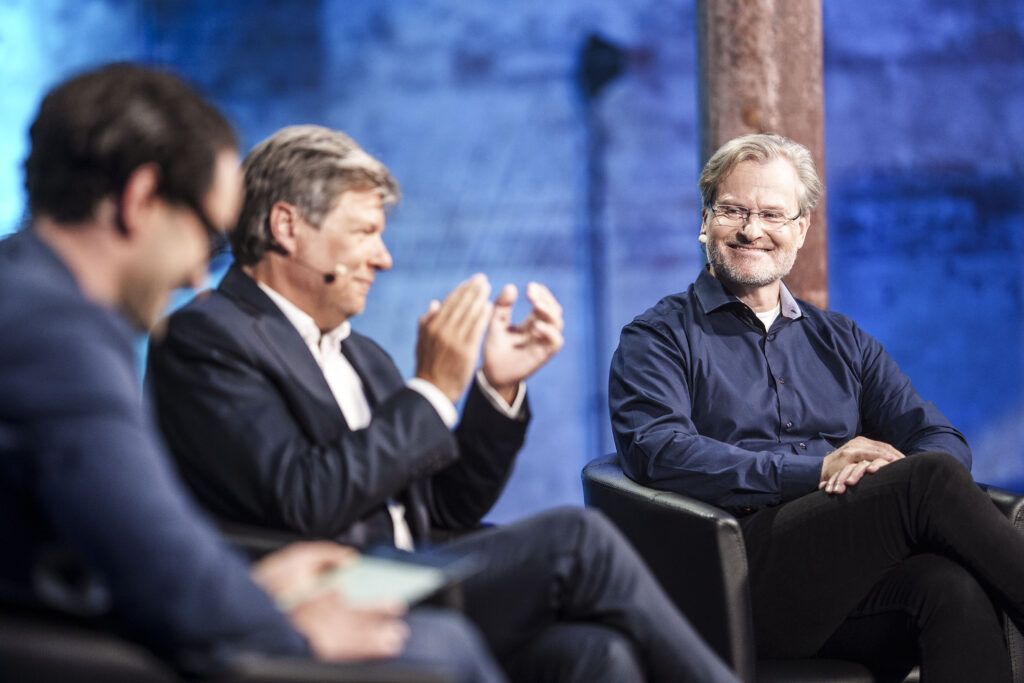
In the next step, attention will be drawn to the success of the Recyclate Initiative in order to prompt other companies to join in. Price is currently an obstacle for many. As before, plastic made from fresh crude oil, referred to as “virgin plastic” is still less expensive than recyclate. “Right now more plastic from the Yellow Bag is incinerated than ever before in Germany because there simply is no overall demand. The price of petroleum is enticingly low. It cannot be that the chance to do what’s ecologically sensible depends on current political crises around the world!” said Schneider. “As a rule, the structural constraints in the markets are always stronger than the corporate commitments toward sustainable products,“ said Habeck.
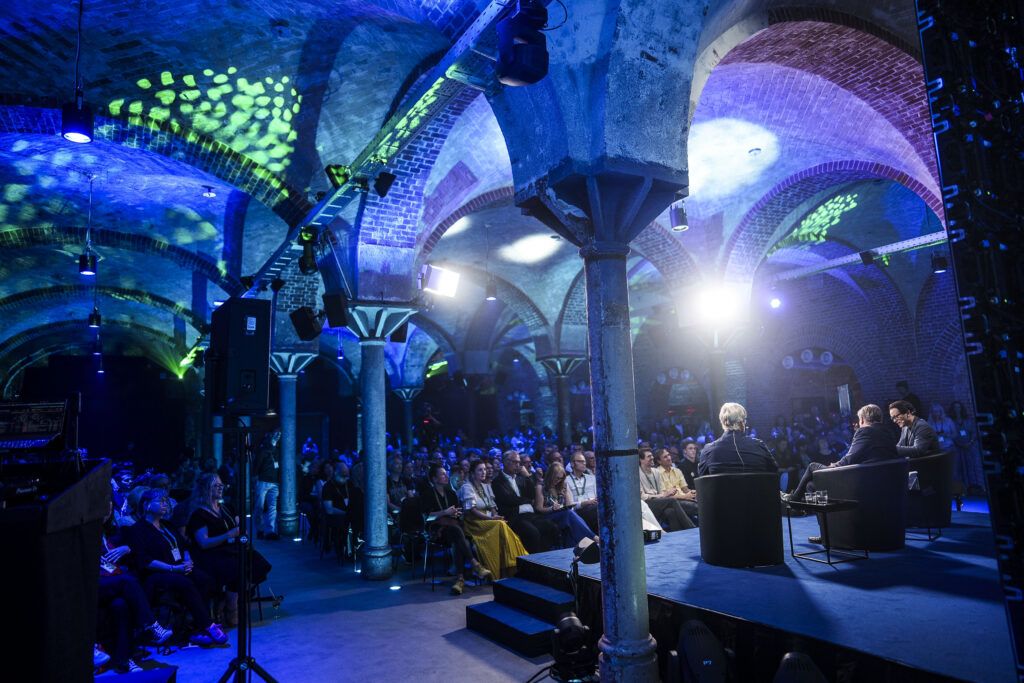
Verifiably effective resource protection vs. populism and ideological accusations
Schneider appealed above all to politicians who should create better general conditions to encourage entry to the ecological transformation. Habeck and Schneider agree that it is difficult, given today’s heated political discourse, to advance concepts for effective resource protection such as mechanical recycling from used plastic from the Yellow Bag.
“We are accused of ideological bias when we criticize chemical recycling, for example. If we then invoke the majority opinion of independent scientists instead, we ourselves are grouped with the ideologues,” said Schneider.
“The ideological accusation is treacherous,” said Habeck. “The word is being reinterpreted. ‘Ideology’ means you are have a closed world view and do not perceive changes in reality. You live in a capsule and don’t look left or right. The reality, however, is that bottles can be made from recyclate without adding crude oil. And that’s called ‘ideology’? No. The failure to see altered reality is the real ideology.”
For many years Werner & Mertz has made the case for rules and laws that would create a level playing field. One example is levying the plastic tax on the polluter, i.e., the distributor who puts packaging made of virgin plastic on the market. Schneider said another is requiring audits by independent experts who examine companies on site to see what they actually do to comply with ESG criteria.
“We have a unique position in credibility and consumer trust,” he said. “We work to keep our promises instead of repeatedly coming up with new ones. That’s our model for financial success.”
Habeck said that such an audit is an example of bureacracy. Today existing rules and laws for the supply chain, taxonomy or sustainability criteria are often equated with bureaucracy or anti-business policy. “The discourse has shifted so far that many no longer trust themselves politically to say that (an audit should be made) out loud, unless of course,” he said, motioning to Scheider, “one does trust himself to say that.”
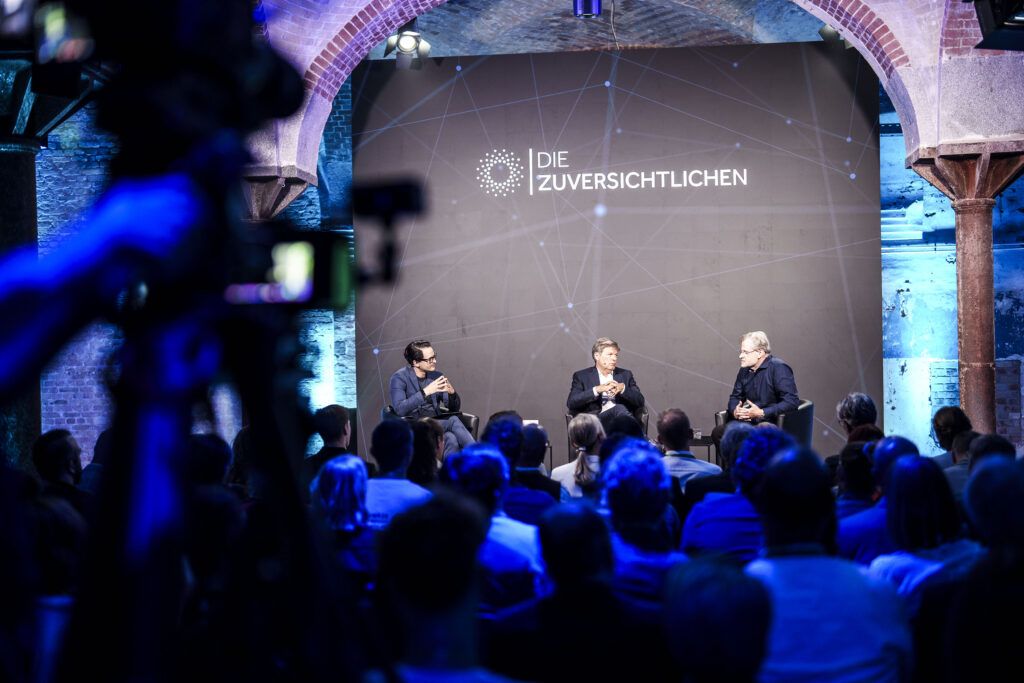
Mechanical recycling contributes to security and prosperity
Both emphasized that the circular economy convincingly contributes to environmental and climate protection and may also play a role in the solution to other current crises:
“If we are to minimize military conflicts brought on by raw material shortages, it makes sense to re-use the things we have. Our country would be more secure if we were less susceptible to blackmail by other countries and if we could keep ourselves out of conflict zones. At a time when it is difficult to speak out in favor of the circular economy for resource conservation and environmental protection, then at least the argument for security and conflict minimization should convince,” said Habeck.
“The circular economy is a model for hope of how we can maintain our Western standard of living without making great sacrifices and without ruining our natural resources. When there are so many wins, I think it’s a no brainer to do that,” said Schneider.
Habeck responded to a question about how he remains confident and keeps on going: “Confidence is work, not blind hope, and it doesn’t happen by itself. The reverse is grim—without hope or readiness to believe that things will work out but rather assuming that everything will go down the drain. That motivates no one. Ultimately, it is our fate to be confident!”
Functioning circular economy always in the focus
In the lead up to the Zuversichtlichen talk, the entire event revolved around a functioning circular economy. NGOs that cooperate with the Frosch brand and Werner & Mertz on environmental and climate protection matters presented their joint work to the invited guests. They included NABU, the NGO Borneo Orangutan Survival (BOS), the species protection organization AGA that protects mangrove forests in Kenya, and the Austrian Alpine Association.
Looking ahead with confidence
Another group discussion took up the topic of ways to give people hope that an end to climate and environmental crises is possible. Katharina Beck, spokesperson for the Green Party’s financial policy and author of Green Ferry, Jan Hegenberg, author of Weltuntergang fällt aus, and Christian Salewski, investigative journalist for Flip, spoke with moderator Zackes Brustik.
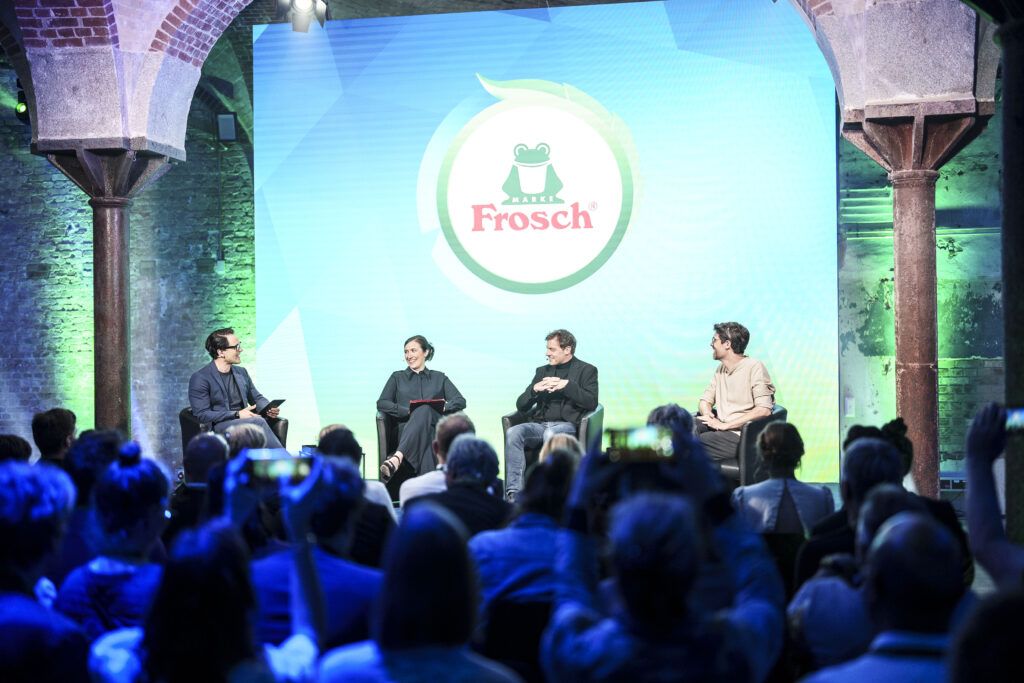
“This celebration of the world record shows that we can contribute to solving crises—that is encouraging and inspiring!” said Beck. She appealed to politicians to make it easier for companies to do business sustainably.
Salewski called the media to account: “News fatigue is terrible. What’s needed is solution-oriented journalism that continues to uncover problems, but doesn’t stop there!” He said the Flip Website has mostly positive examples.
Hegenberg added: “People are emotional beings. We don’t get to them with facts, but rather with the stories we tell about those facts. Ultimately, we all want to live on a clean planet. To that end, we have to go through a dark cave – but there is light beyond it and we’ll get to it – together!”
Frosch brand in harmony with Nature
Later, Karin Greve, Head of Marketing for the Frosch brand in Germany, and Nina Huster, Media Manager for the Frosh brand, provided an exciting look at the communications concept and the image of the eco brand. Hanna Gersmann was the moderator for this segment.
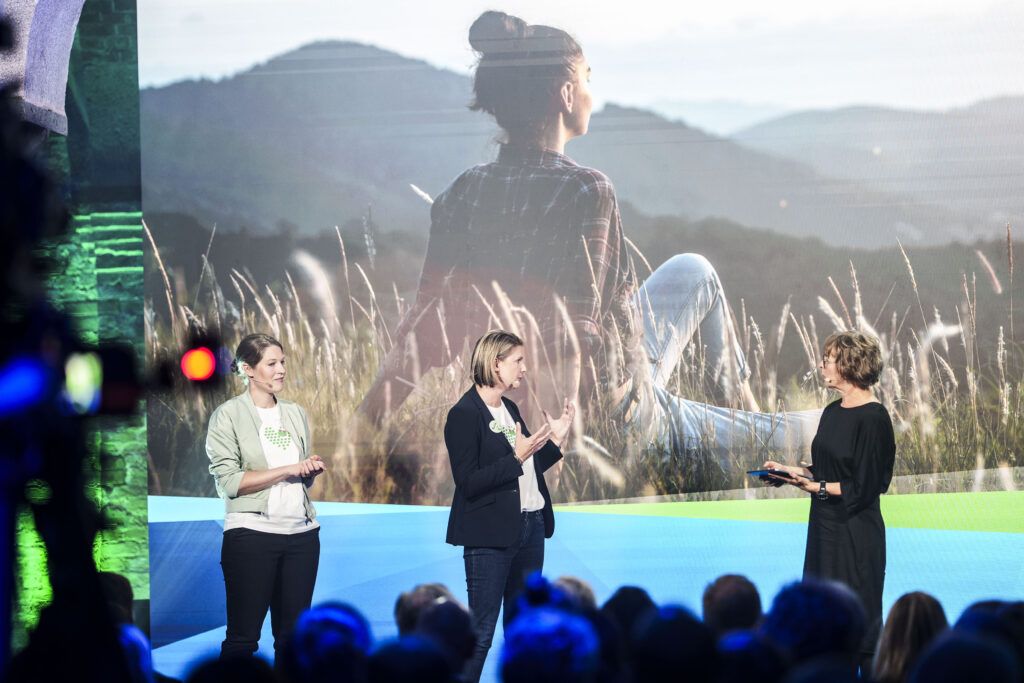
In times of many crises and conflicts, people want small, perfect worlds at home to help them cope with world events. “Relief is a need that we, as the Frosch brand, can credibly meet by taking on that responsibility with our integrally sustainable products,” said Huster.
“People look for meaning. The core concept for our Frosch brand is the connection to Nature. We look to Nature to learn and do not want to burden it. With our products, we create everyday solutions for consumers. At the same time, they help to sustain our planet in the long term,” said Greve. That’s apparent in the new Frosch advertising spot which was released on 23 June when the world record of 1 billion bottles made with 100 percent Post-Consumer Recyclate was set. More about that here.
About the Recyclate Initiative
Together with like-minded cooperation partners along the entire value chain, Werner & Mertz launched the Recyclate Initiative in 2012 and since then has advanced the mechanical recycling of used plastic for high-quality closed-loop circulation of packaging. The initiative sets new standards in ecological feasibility, particularly in the use of material from the Yellow Bag, and has repeatedly increased the proportion in the packging over the past 11 years. The latest success was announced when the world record of 1 billion rPET bottles of 100 percent recyclate was achieved. Effective immediately, all bottles will be converted to 100 percent recyclate from the Yellow Bag!
More info:
About the format Die Zuversichtlichen
In the successful talk show format Die Zuversichtlichen (more than 70,000 livestream viewers), the entrepreneur and author Reinhard Schneider invites authors, networkers and pioneers to speak about the topics we need to discuss if we want to move Germany and the world ahead.
The entire show can be watched here: diezuversichtlichen.de